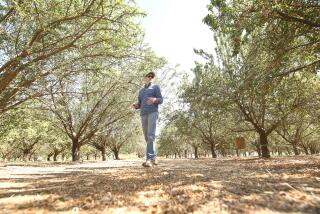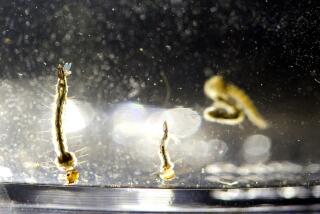OK on Testing of Engineered Bacterium Seen
- Share via
A proposed field test in Tulelake, Calif., involving a genetically engineered bacterium designed to protect potato plants from frost damage, is expected to be approved today by the U.S. Environmental Protection Agency.
The field test, to be conducted by University of California, Berkeley, plant pathologist Steven Lindow, could begin within a week, according to a university spokesman. However, opposition to the experiment may delay it.
The bacterium is virtually identical to the microorganism that was to have been tested on strawberry plants earlier this year by Advanced Genetic Sciences Inc. of Oakland. The EPA withdrew permission for that test in March and fined Advanced Genetic Sciences $20,000 when it learned that the company had already tested the engineered bacterium by injecting it into trees on the company’s roof.
Advanced Genetics has sponsored part of Lindow’s research.
For the potato field test, a bacterium has been engineered to delete the gene that is instrumental in stimulating ice formation at temperatures slightly below freezing.
Lindow plans to plant potatoes soaked in a solution of the engineered bacterium within a week, the university spokesman said. When the plants have emerged, within about threes weeks, they will be sprayed with a similar bacterial solution.
Lindow hopes that the engineered bacteria will displace the naturally occurring bacteria that would colonize the plants and thereby impede frost formation.
If the potatoes are not planted within the next week or two, there will probably not be enough frost for a satisfactory test until this fall.
Lindow was initially given permission by the National Institutes of Health to begin testing the organism in October, 1983. However, that test was blocked by a lawsuit filed by Washington activist Jeremy Rifkin. The suit was resolved in Lindow’s favor in February, 1985, although the court ruled that Lindow had to file a longer environmental impact statement.
In the interim, regulatory control of such field tests passed from the National Institutes of Health to the EPA.
Lindow’s project still may have several hurdles to overcome. A group called Concerned Citizens of Tulelake claims to have collected about 250 signatures--out of a population of about 1,200--on petitions opposing the experiment. Lindow was to meet with those citizens Monday night at a meeting called by the Tulelake City Council.
He also plans to meet with the Board of Supervisors of Siskiyou County tonight and with the Board of Supervisors of Modoc County on Monday to address their concerns. The university has experimental plots in both counties.
In Monterey County, where Advanced Genetic Sciences had planned its field test, the supervisors blocked the experiment.
On Monday, Rifkin urged both the university and the EPA not to approve the potato field test, because the university’s liability insurance is due to expire July 1.
Rodney Umscheid, the University of California’s director of risk management and safety, confirmed Monday that the university has not been able to obtain new liability coverage, because “pollution insurance is simply not available.”
He added, however, that the university “will have an insurance program in place July 1.”





